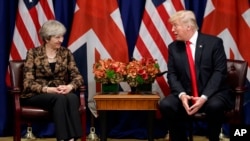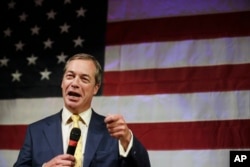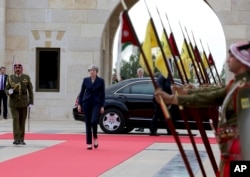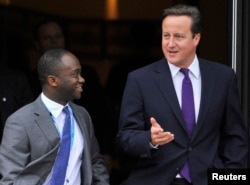U.S. President Donald Trump pulled off a rare feat this past week. His retweeting Wednesday of anti-Muslim videos first posted by an obscure Islamophobic British fringe group on the far-right, and his subsequent put down of Prime Minister Theresa May after she rebuked him for it, has united normally fractious British lawmakers.
Two days after the presidential retweeting, they were still lining up in parliament and television studios to condemn Trump with a ferocity not displayed toward a U.S. president since the 1980s, when Labor lawmakers did not hold back in their criticism of then-U.S. President Ronald Reagan.
This time, though, the censure is across party lines — including from leading Brexiter and Trump friend Nigel Farage, who the U.S. president earlier this year asserted proactively should be made Britain's ambassador to the United States.
The retweeting of three unverified videos purporting to show a "Muslim migrant" beating up a Dutch boy on crutches, a "Muslim" destroying a statue of the Virgin Mary and an "Islamist mob" pushing a teenager off a roof and then beating him to death, showed "poor judgement," Farage said on his radio show in the British capital.
Farage added, though, that the reaction from Britain’s "political class" had been "over the top" (excessive) and suggested, "This will blow over in a couple of weeks."
British officials hope he’s right.
Measured reaction
Despite May’s public rebuke about the sharing by Trump of far-right propaganda, they feel the British prime minister has been measured in her reaction. They say she had no choice for domestic political reasons but to upbraid the president for giving a platform to the fringe group Britain First, whose leaders have been convicted for hate speech in the past.
"The fact that we work together does not mean that we’re afraid to say when we think the United States has got it wrong, and be very clear with them," May said on a visit to Amman about the retweets. "And I'm very clear that retweeting from Britain First was the wrong thing to do."
Trump’s subsequent tweet Thursday, when he told the British prime minister, "Don’t focus on me, focus on the destructive Radical Islamic Terrorism that is taking place within the United Kingdom. We are doing just fine," has in some ways alarmed British government ministers more.
"It shows Trump really doesn’t care what we think; he seems almost contemptuous," said a British official, who spoke on condition of anonymity. "And that makes it harder for us to control the fallout," he added.
Pressure continued to mount Friday on the prime minister — even from some among her ruling Conservatives, to withdraw a long-standing invitation for Trump to visit Britain. One government minister, Sam Gyimah, said he was "deeply uncomfortable" about the prospect of a visit.
Disinviting a president would be unprecedented in modern Anglo-American history, and British officials say that even amid the war of words, they have absolutely no intention of doing so.
Preparations are still under way for Trump, they say, to visit Britain, most likely in February, when he is expected to open a new U.S. embassy in London on what is being dubbed a "working trip."
The planned trip, which was first discussed in October, already is a pared down version of a state visit that was first offered by May days after Trump's inauguration and would involve no meeting with Queen Elizabeth. A full state visit, officials on both sides of the Atlantic feared, could trigger mass protests.
Trump surprise?
No one, however, would be surprised if Trump himself decides to postpone a trip early next year to Britain — and that would be both relieving and worrying from a British perspective.
May’s government is caught in a dilemma, noted British newspaper The Times, which argued Trump’s tweeting has "put Mrs. May in a difficult position" as the first foreign leader to have visited him at the White House and offered a return invitation.
Public antipathy in Britain toward Trump, prompted by a series of controversies that have put the U.S. leader at odds with the British, is unlikely to abate by February. A disastrous visit could further roil relations, adding to an unprecedented toxicity in the "special relationship" not seen since the Suez crisis of 1956, when Britain joined France and Israel in a bid to remove then-Egyptian leader Gamal Abdel Nasser from power without Washington’s approval.
This has come at a time the British government is desperate for a post-Brexit trade deal with the U.S. to help reduce the economic damage from leaving the European Union. "The prospect of a successful or at least survivable Brexit is posited on a strong relationship with Washington," according to Julian Borger, diplomatic editor of The Guardian.
Early eagerness
That was what motivated May’s eagerness to be the first foreign leader to visit Trump’s White House — a visit British officials had no hesitation in presenting as a major diplomatic accomplishment.
And they had high hopes May would be able to influence the new president and form a strong bond with him much as her predecessors at Downing Street managed to do in the past. With spats becoming a feature now of the so-called "special relationship" — in September May publicly admonished Trump for questioning the handling by British security forces of a terror attack on the London Underground — the fear among British diplomats is that the ties between London and Washington are fraying.
Disputes with the U.S. president are only part of the problem for May. The two disagree on major foreign policy issues, too, including over whether to observe the nuclear deal with Iran, an agreement Trump has said he would like to tear up, and on how to handle North Korea and its nuclear posturing. All this comes as Britain sees its relations with European allies buffeted in negotiations over Brexit.







